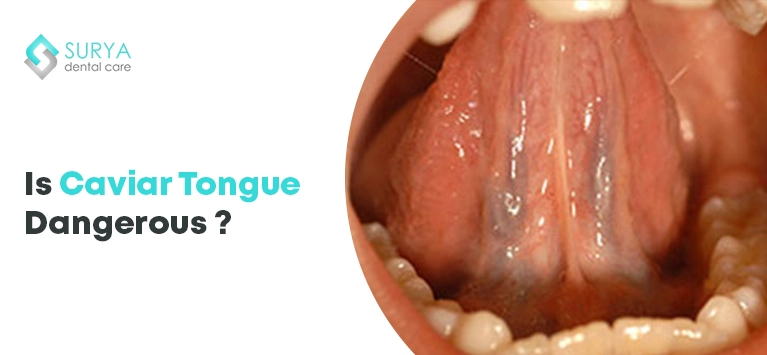Caviar tongue is a common temporary oral condition that affects the undersurface of the tongue, which is also known as black hairy tongue is a condition that may sound alarming and looks very dangerous to our eye when we take a look but is usually harmless. More than 10% of people over 40 years of age are affected by caviar tongue.
Despite its intimidating name, caviar tongue is not linked to excessive consumption of delicacy food. Instead, it is associated with certain factors that can lead to discoloration and elongation of the tiny hair-like projections on the undersurface of the tongue.
What Is Caviar Tongue?
Caviar tongue manifests as a black or dark brown discoloration in the veins on the undersurface of the tongue. This unusual appearance results from an overgrowth and staining of filiform papillae (structures on the tongue responsible for texture and sensation). These papillae can become elongated and trap microscopic food particles, bacteria, and other substances, which leads to discoloration.
Causes of Caviar Tongue
Caviar tongue is commonly a physiological change that happens as we age. We usually see veins under the tongue due to the thin mucous membranes. When we age, our body can’t repair blood vessels, which makes it weak and hard to maintain its shape. Caviar tongue is mainly caused by aging factor, and according to some research, there are some other causes of caviar tongue
- poor oral hygiene
- smoking or tobacco use
- excessive alcohol consumption
- certain medications
- Vitamin deficiencies
- Chronic liver disease
1. Poor oral hygiene
When bacteria build up on the surface of the tongue, it can lead to discoloration and an overgrowth of papillae, giving the appearance of a black and hairy texture. Improving oral hygiene practices such as regular brushing of teeth and proper cleaning of the mouth can help prevent and alleviate symptoms.
2. Smoking or tobacco use
Tobacco products can stain the teeth and contribute to the discoloration of the tongue. Smoking can also decrease saliva production, leading to a dry mouth, which can exacerbate caviar tongue. Avoid smoking and consumption of hot foods regularly. Both can damage the inner lining of the mouth.
3. Excessive alcohol consumption
Alcohol consumption can dehydrate the body and reduce saliva production, creating an environment where bacteria thrive on the surface of the tongue. This bacteria can affect your veins under the surface of the tongue. Regular drinking of alcohol without consumption of enough hydrating foods and water should be avoided.
4. Certain medications
Some medications, such as antibiotics or medications containing bismuth (found in some antacids), can disrupt the average balance of bacteria in the mouth and contribute to caviar tongue. In some cases where medications are suspected triggers for caviar tongue, adjusting medication regimens may be necessary.
5. Vitamin deficiencies
Deficiencies in specific vitamins, particularly B vitamins such as B12 or folate, can affect oral health and contribute to conditions like caviar tongue.
6. Chronic liver disease
Liver disease can impact overall health, including oral health. Individuals with chronic liver disease may be more prone to developing caviar tongue due to factors such as dehydration or compromised immune function.
Caviar Tongue Symptoms
Caviar tongue does not cause pain, so it can only be seen visually. Caviar tongue is an asymptomatic condition, but if you notice any of the signs mentioned below, you can check the undersurface of the tongue.
- Dark purple coloration caused by elongated papillae trapping debris
- Individuals with caviar tongue may experience bad breath (halitosis) due to bacterial buildup in the affected areas.
- Some people may also report an altered taste sensation or a tickling sensation in their mouth.
- Dark-colored or black hairy projections on the surface of the tongue.
- The fuzzy or furry texture on the top surface of the tongue.
- Dryness or burning sensation in the mouth.
- Discomfort when eating spicy or hot foods.
- Increased sensitivity to certain foods or beverages.
Is Caviar Tongue Dangerous?
While caviar tongue can be unsightly and cause discomfort due to altered taste sensations or bad breath, it is generally considered harmless and temporary. Rarely does caviar tongue lead to serious complications; however, persistent cases should be evaluated by a healthcare professional.
How to Identify Caviar Tongue
As caviar tongue does not cause any pain or discomfort, we can find it only visually. Here are some points on how it actually appears in our mouth
- The most noticeable characteristic of the caviar tongue is its unusual appearance. The top surface of the tongue may appear black or dark brown.
- Tiny elongated bumps give the tongue a rough, hairy texture.
- Long tail-shaped veins appear in a dark purple color underneath the tongue.
Caviar Tongue Treatment
Caviar tongue is a benign condition that does not need any treatments. The one who worries about the damage to the aesthetic look caused by caviar tongue can go for laser treatment, and some choose sclerotherapy to remove the affected veins.
There are no worries and need for caviar tongue treatment other than aesthetic looks and discomfort caused by caviar tongue during your daily routines.
Takeaway
Caviar tongue is a common unharmful condition seen in most people over 40 years of age. When caviar tongue affects your lips and the inner lining of the mouth other than the undersurface of the tongue, you need to consult with dentists to avoid some discomforts and get your aesthetic look back.



